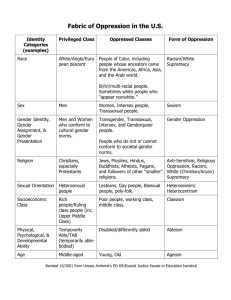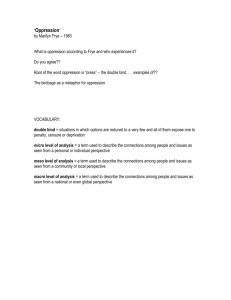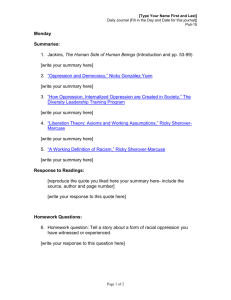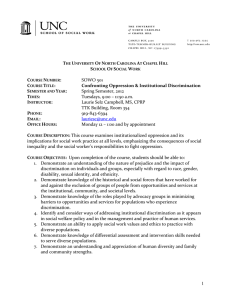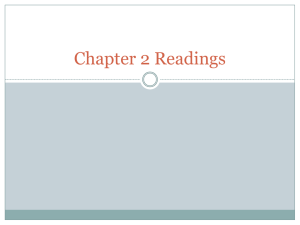SOWO 501 Spring Semester, 2012 Fridays, 2:oo – 4:50 pm
advertisement
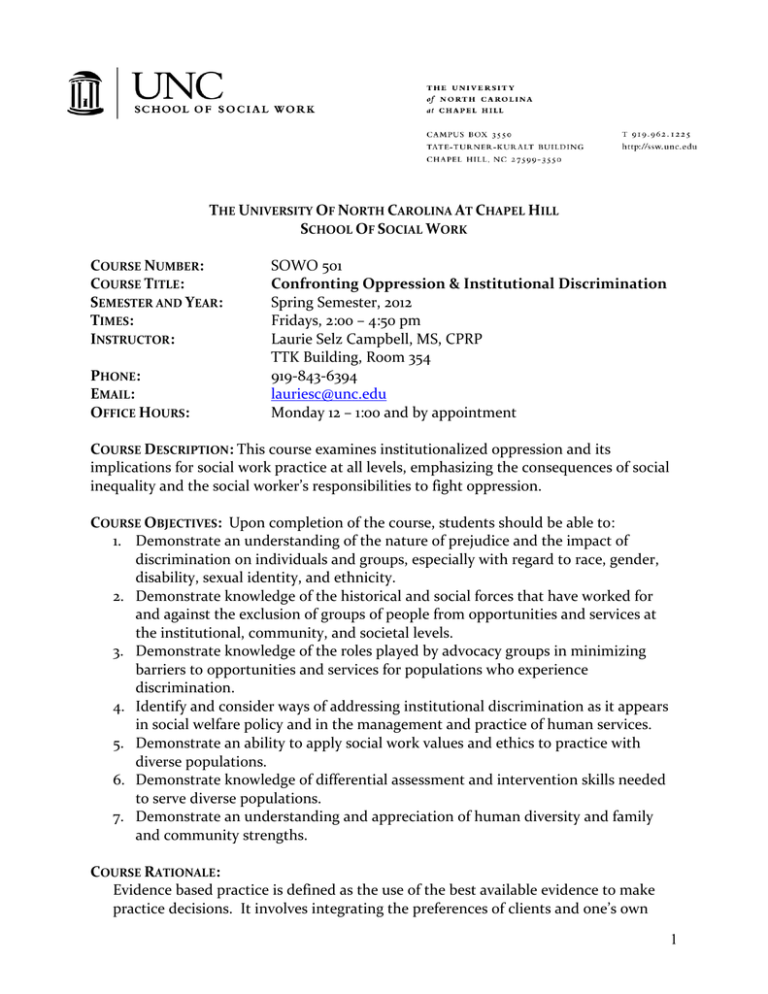
THE UNIVERSITY OF NORTH CAROLINA AT CHAPEL HILL SCHOOL OF SOCIAL WORK COURSE NUMBER: COURSE TITLE: SEMESTER AND YEAR: TIMES: INSTRUCTOR: PHONE: EMAIL: OFFICE HOURS: SOWO 501 Confronting Oppression & Institutional Discrimination Spring Semester, 2012 Fridays, 2:oo – 4:50 pm Laurie Selz Campbell, MS, CPRP TTK Building, Room 354 919-843-6394 lauriesc@unc.edu Monday 12 – 1:00 and by appointment COURSE DESCRIPTION: This course examines institutionalized oppression and its implications for social work practice at all levels, emphasizing the consequences of social inequality and the social worker’s responsibilities to fight oppression. COURSE OBJECTIVES: Upon completion of the course, students should be able to: 1. Demonstrate an understanding of the nature of prejudice and the impact of discrimination on individuals and groups, especially with regard to race, gender, disability, sexual identity, and ethnicity. 2. Demonstrate knowledge of the historical and social forces that have worked for and against the exclusion of groups of people from opportunities and services at the institutional, community, and societal levels. 3. Demonstrate knowledge of the roles played by advocacy groups in minimizing barriers to opportunities and services for populations who experience discrimination. 4. Identify and consider ways of addressing institutional discrimination as it appears in social welfare policy and in the management and practice of human services. 5. Demonstrate an ability to apply social work values and ethics to practice with diverse populations. 6. Demonstrate knowledge of differential assessment and intervention skills needed to serve diverse populations. 7. Demonstrate an understanding and appreciation of human diversity and family and community strengths. COURSE RATIONALE: Evidence based practice is defined as the use of the best available evidence to make practice decisions. It involves integrating the preferences of clients and one’s own 1 accrued practice expertise with current scientific information. Because “the evidence” is unlikely to ever be so robust as to fully inform practice with the diversity of human kind, the evidence must always be interpreted and, in some cases, extrapolated. It is in this crucial process that knowledge of the impact of discrimination and inequality on human behavior becomes paramount. The Code of Ethics of the National Association of Social Workers (NASW) stipulates that one of the ethical principles that must guide social workers is that “Social workers challenge social injustice” (1999, p.2). Specifically, the Code directs social workers to “pursue social change, particularly with and on behalf of vulnerable and oppressed individuals and groups of people. Social workers' social change efforts are focused primarily on issues of poverty, unemployment, discrimination, and other forms of social injustice” (NASW, 1999, p.2) These activities are anchored to one of the fundamental missions of the social work profession, which is to “strive to end discrimination, oppression, poverty, and other forms of social injustice” (NASW, 1999, p.1). The intent of this course is to prepare students to fulfill their responsibilities related to fighting injustice and oppression, as prescribed by the Code. All social workers have a responsibility to meet the needs of diverse client systems in our society; therefore, all social workers must have knowledge and understanding of the structures, systems, and policies that create and maintain institutional oppression. The focus is on special population groups that should be understood in the context of not only problems that often accompany their particular status, but also from the richness of their heritage and the potential for their beneficial contribution to society. This course serves as a foundation for the understanding of the nature, character, and consequences of being excluded or left out of many available opportunities and services. It explores the implications and connections of discrimination for oppressed groups, including racial and ethnic minorities, women, older persons, people with disabilities and gay, lesbian, bisexual, and transgendered (GLBT) people. The common denominator for all of these groups is the fact that they have been constantly affected by social, economic and legal biases—they have been victimized by institutional structures and social policies that maintain and perpetuate their oppression. REQUIRED TEXTS: Adams, M. et al., eds. (2010). Readings for diversity and social justice (2nd ed.). New York: Routledge Publishers. Carlton-LaNey, I. (2005). African Americans aging in the rural south: Stories of faith, family and community. NC: Sourwood Press, Inc. Kivel, P. (2011). Uprooting racism: How white people can work for racial justice (3rd ed.). Gabriola Island, BC: New Society Publishers. Additional readings will be posted on Sakai. 2 TEACHING METHODS AND EXPECTATIONS: Teaching methods will include lecture and class discussion, as well as multimedia presentations, guest speakers, and experiential activities. My perspective is that we all have much to learn AND much to teach. Full participation is essential to your learning process in the class, and will allow you to successfully apply the course material in a way that is personally and professionally meaningful. The class will ask you to personally reflect on issues and material that may not always be comfortable. We will discuss early on the concept of “safer space,” and will generate some guidelines that will allow all of us to engage authentically, and to treat each other with respect, compassion, and honor. Your regular attendance is critical to your learning, as well as to the atmosphere of inclusiveness and trust in the class. I ask that you contact me, in advance, if you will miss a class. Any student with significant difficulty with class participation requirements should speak with me at the beginning of the semester so that alternative forms of contribution can be identified. POLICIES ON THE USE OF ELECTRONIC DEVICES IN THE CLASSROOM: I expect that we will all be invested in creating a learning environment of respect and engagement. I welcome the use of laptops in class for taking notes or completing small group tasks. However, I ask that you use them only for relevant activities – not for checking email or surfing the Web. During class, cell phones and other devices should be silenced. ACCOMMODATIONS FOR STUDENTS WITH DISABILITIES: Students with disabilities which affect their participation in the course should notify the instructor if they wish to have special accommodations in instructional format, examination format, etc., considered. Accommodations and services are provided by Disability Services (Voice/TDD 962-8300; 966-4041). Learning Disability Services (962-7227) provides supportive services for students with learning disabilities and attention-deficit/hyperactivity disorders. POLICY ON ACADEMIC DISHONESTY: Academic dishonesty is contrary to the ethics of the social work profession, unfair to other students, and will not be tolerated in any form. All written assignments should include the following signed pledge: “I have neither given nor received unauthorized aid in preparing this written work.” In keeping with the UNC Honor Code, if reason exists to believe that academic dishonesty has occurred, a referral will be made to the Office of the Student Attorney General for investigation and further action as required. Please refer to the APA Style Guide for information on attribution of quotes, plagiarism, and appropriate citation. POLICY ON INCOMPLETES AND LATE ASSIGNMENTS: Late assignments are strongly discouraged, but may be accepted in some cases. All assignments are due at the beginning of class on the day noted. You must contact me 3 prior to a due date if you would like to request an extension, or you will lose 10% of the assignment’s points per day (including weekends and the date on which the assignment was due, if submitted after the beginning of class). Incompletes may be granted if (a) there are extreme and unforeseeable circumstances that affect your ability to complete the semester’s work, and (b) you meet with me in advance to develop a plan and timeline for completing your work. ASSIGNMENT GUIDELINES: All written assignments must be typed and follow APA format. Several writing resources are posted on the SSW website. You can also refer to the APA Publication Manual (6th edition), and to a tutorial on APA style at http://www.lib.unc.edu/instruct/citations/apa/index.html. ASSIGNMENT DESCRIPTIONS: Descriptions of the course assignments are below. Additional detail (for some) and scoring rubrics will be posted under Assignments on Sakai. Assignment 1: Personal Reflections 3 @ 5 points apiece, 15 points total Due Jan 27, Feb 17, March 23 These exercises encourage you to think through (in writing) your personal responses to course readings and/or activities. You can feel free to focus on any aspect of the readings or activities that strike you on a personal level. The reflections should be 1-2 pages long (longer if you like, but not necessary), can be written in first person, and do not need to use APA style. You should begin with a brief reference to the reading(s) or activity on which you will be reflecting. For example “This reflection focuses on my response to the classism activity,” or “This reflection focuses on the Cycles of Oppression and Liberation described by Harro in the Adams text.” In writing your reflection, the following questions may be helpful (don’t let these limit you, however; feel free to use them as needed to jump start the reflection process): In what way did this reading or activity strike a personal chord for you? What is the nature of your reaction (positive? negative? ambivalent? confused? dissonant?) What emotions did you experience? Where or how do you see the content of the reading or activity playing out in your professional or personal life (for example, field placement, interactions with friends or family, experiences here at the school)? How do your personal responses relate to your ongoing development as a social worker? What areas of strength and/or potential growth can you identify? Your thoughts do not need to be fully formed or organized in a linear way. Anything that you communicate will be held in confidence, and you will not be required to share anything that you write with other class members. 4 Assignment 2: Analysis Paper on Crash 15 points Due March 2 Based on your viewing of the film Crash, you will submit a 5-7 page paper that reflects your understanding and application of concepts of privilege, oppression, classism, and racism. Specific questions to guide your writing and point you to relevant readings will be provided prior to viewing the film. Assignment 3: Community Meeting 10 points Due March 30 For this assignment, you will attend a community meeting or event of a population subgroup other than your own. You have a wide range of choices for the meeting or event – for example, you may choose a church service, AA meeting, concert, play, dance production, or advocacy group meeting. It is essential that you attend alone. Then, in 3-4 pages, please describe the meeting or event, and reflect on your experience of attending. What concepts discussed in class provide insight into your experience? What did you take from this event that may help you to better understand the experience of difference and/or marginalization, the dynamics of inclusion and exclusion, and/or your role as a social worker? Assignment 4: Presentation on Alliance & Just Practice 25 points Due April 13 or 20 This 30-40 minute presentation will be completed in teams of 3-4 students. You are free to use PowerPoint or other media to communicate your message to the class. The following is a broad overview of what will be asked of each team: 1. Identify a focus population. You are free to focus on a population of persons that we have discussed in class, or to identify another group of interest to you. Then, using the scholarly literature as your foundation, address the following questions: 2. How has this group been treated historically in our culture? 3. What assumptions, beliefs, attributions, or cultural dynamics appear to drive the oppression or discrimination of this group? 4. What intersections of oppression might impact this group? Are there intersections that are particularly prevalent? 5. What are examples of specific oppressive or discriminatory practices that this group has encountered as they interact with various institutions? Please identify a minimum of three examples of institutional oppression, supported by the scholarly literature. You may include social, economic, 5 educational, faith, social service, and health care institutions in your discussion, as well as any others of relevance. 6. What advocacy efforts or groups have been developed in response to the oppression of your group? Please identify a minimum of two examples of advocacy. In what ways have these groups been effective? In what ways do they struggle to achieve their aims? 7. What are direct practice and macro-level implications for the social worker who works with individuals from this population? What are 2-3 specific understandings that might impact your interactions with members of this group? How can you work within what might be oppressive institutional structures to provide responsive services? How can you work toward system change, working with existing advocacy efforts or in other ways? Slides should be formatted using APA style for citations and references. That is, you should provide citations at the bottom of slides containing information from scholarly sources, and include a complete list of references on the final slides, or as a handout. You do not need to make copies of your slides for the class, BUT you should submit a copy to the instructor (either hard copy or electronic). A scoring rubric will be posted on Sakai. Assignment 5: Alliance & Just Practice Individual Paper 15 points Due April 27 This 4-6 page paper is to be written on the same group that was the focus of your team’s project, above. Based on (a) your emergent knowledge of how privilege and oppression have played out for you personally, and (b) the scholarly research that you completed for the team presentation, you will reflect on your own strengths, limitations, and areas for evolution in terms of future practice with this particular group. GRADING SYSTEM: Points and grades will be assigned as follows: Online course Meaningful participation Personal reflection Crash paper Community meeting Alliance/just practice presentation Alliance/just practice paper Total 10 10 15 15 10 25 15 100 94 - 100 80 - 93 70 - 79 <70 H P L F 6 COURSE OUTLINE Date Jan 13 Jan 20 Focus, Activities, Readings Focus: Activity: Introduction to Course & Each Other Small groups on” safer space” & “the invisible knapsack” Readings: McIntosh, P. (1990). White privilege: Unpacking the invisible knapsack: Independent School, 49(2), 31-35. (will be distributed & read in class) Focus: Guiding Concepts Social construction; intersections of oppression; systems of oppression; cycles of oppression & liberation View selections from Race: The Power of an Illusion Activity: Readings: Due Adams: Section 1: Conceptual Framework Kivel: Preface; Preface to 3rd Edition; Introduction Part 1: What Color is White? (pp. 7-27; 43-75) Part 2: The Dynamics of Racism (pp. 78-88; 103-113) Part 3: Being Allies (pp. 115-146) Part 5: Fighting Institutional Racism (pp. 209-212) Jan 27 Feb 3 Focus: Activity: Heritage Gallery & Reflection on Identity Please bring an expression of your heritage for display and discussion. This can be an artifact, food, art form, clothing anything that expresses your identification with a particular aspect of your heritage. Readings: Finish the massive amount of reading from last week! Focus: Activity: Classism & the Construction of Poverty & Privilege Intergroup dialogue on class & classism Readings: Adams: Section 3: Classism (review Introduction as needed; article 26; 30; 36; 37) Optional: article 136 on intergroup dialogue 1st Personal Reflection Heritage Gallery object or expression Mantsios, G. (2009). Media magic: Making class invisible. In T. E. Ore (Ed.), The social construction of difference & inequality (pp. 88-96). New York, NY: McGraw-Hill. Feb 10 Focus: Viewing & Discussion of Film “Crash” Readings: Adams: Section 1: Conceptual Framework (review articles 6 & 7) Section 9: Ageism & Adultism (article 116; 117) 7 Date Focus, Activities, Readings Due Kivel: Part 5: Fighting Institutional Racism (pp. 235-252; 256-267) Feb 17 Focus: Activity: Bringing it Home to NC – Meet in Auditorium today Panel of advocates Readings: Adams: Section 2: Racism (article 10; 14; 15) Section 3: Classism (article 35) 2nd Personal Reflection Kivel: Part 4: The Effects of History (pp. 147-178; 198-205) North Carolina Commission of Indian Affairs (2008). North Carolina’s First People. Raleigh, NC: Author. School of Government, UNC-CH (2009). Selections from Popular Government Magazine, Special Issue: Immigration Impacts on North Carolina, Vol. 74, No. 3 http://sogpubs.unc.edu/electronicversions/pg/pgspsm09/a rticle2.pdf Feb 24 Mar 2 Focus: Activity: Sexism & Heterosexism TBD Readings: Adams: Section 3: Classism (article 33) Section 5: Sexism (Introduction; article 61; 62; 64; 65; 66; 68; 75; 76) Section 6: Heterosexism (Introduction; article 78; 79; 83; 84) Section 7: Transgender Oppression (Introduction; article 87; 91; 93) Focus: Activity: Ageism TBD Readings: Adams: Section 9: Ageism & Adultism (Introduction; article 118; 120; 122; 127) Crash Paper Carlton-LaNey, I. (2005). African Americans aging in the rural south: Stories of faith, family, and community. NC: Sourwood Press, Inc. (Read Chapter 1. Remaining chapters will be divided among class members) Mar 9 ** Happy Spring Break!! ** 8 Date Mar 16 Focus, Activities, Readings Focus: Activity: Religious Oppression TBD Readings: Adams: Section 4: Religious Oppression (Introduction; article 45; 46; 47; 49; 50; 58) Due Kivel: Part 4: The Effects of History (pp.179-197) Part 5: Fighting Institutional Racism (pp. 268-270) Hodge, D. (2002). Does social work oppress evangelical Christians?: A “new class” analysis of society and social work. Social Work, 47(4), 401-414. Mar 23 Focus: Activity: Alliance & Just Practice TBD Readings: Adams: Section 10: Working for Social Justice (article 129; 130; 131; 135) 3rd Personal Reflection Kivel: Part 6: Democratic, Anti-Racist Multiculturalism (pp. 280302) Goodman, L. A., Litwin, A., Bohlig, A., Walker, J., White, L., & Ryan, N. (2007). Feminist theory to community practice: A multilevel empowerment intervention for low- income women with depression. In E. Aldarondo (Ed.), Advancing Social Justice through Clinical Practice (pp. 265-290). Mahwah, NJ: Lawrence Erlbaum Associates. Mar 30 Focus: Activity: Oppression of Persons with Disabilities TBD – Simulation OR panel discussion Readings: Adams: Section 8: Ableism (Introduction; article 96; 99; 100; 110; 114) Apr 6 No Class – Good Friday Apr 13 Alliance & Just Practice Presentations Apr 20 Alliance & Just Practice Presentations Apr 27 (No class meeting since semester has ended!) Community Meeting Paper Alliance & Just Practice Paper 9
